If you are a self-motivated individual who wants more flexibility in your day-to-day life, becoming a freelancer can give you the financial and location freedom you crave.
But, figuring out how to become a freelance writer can seem daunting at first. Fortunately, the path to becoming successful is more or less the same whether you want to become a fiction or nonfiction writer, online or off.
There are certain steps you must take to build a solid foundation for a profitable freelance writing business.
Read the rest of this guide to discover the 8 steps you must take to set up your business and land your first client.
1. Do Your Research
If you’re reading this article, then I guess you’ve already started on your first step in learning how to become a freelance writer by doing research.
Freelancers can write everything from blog content, landing page copy, and ads, to press releases, product descriptions, technical documents, novels, short stories, and even quarterly journals.
There is a need for all types of writers in every industry you can think of. That’s why your first step is to determine exactly what the job entails and where you fit in.
The easiest way for you to conduct your research is to read through articles like this one and take notes.
- Visit the blogs of successful writers who teach others their craft.
- Learn their writing processes
- Make notes of where they look for work
- See how they set their rates
… and any other information you think might be pertinent.
There are a lot of writers who share helpful information on how to get into freelance writing or other side hustles.. Furthermore, you might browse opportunities on freelance writing job boards and marketplaces, such as:
- Pro Blogger
- Fiverr
- Indeed
- Linkedin Jobs
- Upwork
… and others.
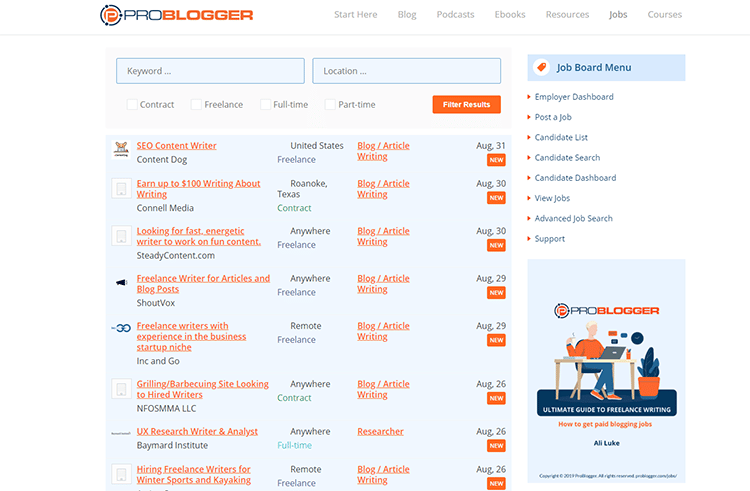
This will give you a very good idea of the types of jobs that are available, what the market wages currently are, and what employers expect from freelance writers.
Your research will also give you a very good idea of what type of writer you want to be, depending on the tone and style that appeals to you the most. For example, you might choose to be a freelance content writer, copywriter, ghostwriter, academic writer, or columnist.
Once you’ve found out everything you can about the freelance writing industry, you can then move on to the next step, which involves taking a long hard look at the writing skills you possess.
2. Take Stock of Your Skills
Before you can move forward, you must find out what your overall skill level is. It can be hard to rate your own skills in the marketplace, but you might get a good idea of where you stand by considering the following sets of skills:
- Writing and Editing Skills: As a freelance writer, you’ll have to be an all-rounder. In addition to writing, you should be able to proofread and edit your own work so you can submit polished pieces that will bring you new and repeat clients.
- Time Management and Organization Skills: Whether it’s a calendar, to-do list, or filing system, you must ensure you have the fundamental skills to help you run a successful freelance writing business.
- Communication and Networking Skills: As a writer, you’ll have to communicate with editors, managers, marketers, etc. You’ll also have to find potential clients through networking, which is why you should brush up on these skills.
- Marketing Skills: This is an essential skill for any business, and as a freelance writer, you’ll need to effectively market your writing through a professional website, blog, social media presence, business networking sites, and various other platforms.
- Accounting and Business Management Skills: You may need to create professional invoices and keep accurate and thorough records, as well as understand and calculate tax.
3. Create a Strategy
Once you’ve researched freelance writing and taken stock of your skills, you’ll have a very good idea of where stand right now and where you want to be in the future.
You need to create a strategy that will take you from where you are to where you need to go. One of the best ways to create such a strategy is to look for others who’ve achieved success as freelance writers and learn from their examples.
A lot of successful professional writers share their stories on their blogs and you can even get in touch with some of them to ask questions. You’ll find that many successful writers are eager to help aspiring freelancers find success as well.
4. Get the Right Tools
Before you can start writing as a professional, you must make sure you have the tools of the trade.
You’ll need a computer – whether desktop or laptop. Make sure it’s equipped with a reliable writing program like Google Docs, Microsoft Office Online, Zoho Writer, etc. You’ll also need proofreading and editing tools like Grammarly or the Hemmingway App to help improve your writing.
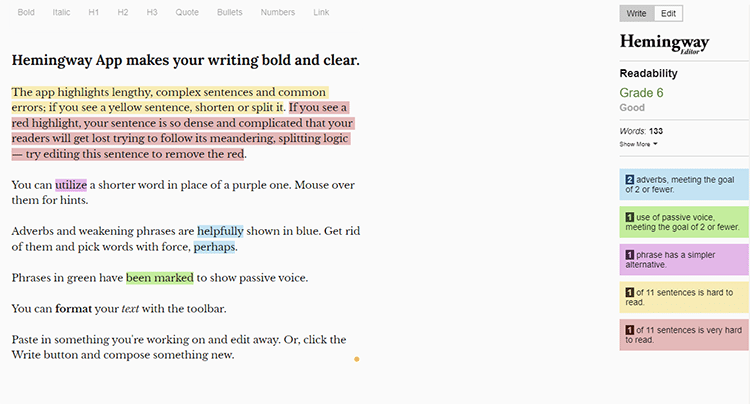
You also need task management software like ClickUp or Chanty, as well as communications software like Skype, Zoom, etc.
Depending on the type of content you create, you may need other tools such as photo editing or graphic design software to create high-quality images for your content. There are plenty of freemium options available to choose from, such as Canva.
You’ll also require a bank account, as well as an online payment service like PayPal or Stripe so you can receive payment from your clients.
5. Choose Your Writing Niche
Successful businesses are always hiring freelance writers to help them scale their content production.
Research shows that spending will reach $877.66 billion by 2028. But, even with freelancing becoming the new normal, it doesn’t mean that you must write about anything and everything. In fact, you’ll find better success by specializing in a particular niche.
Here are some of the benefits of choosing a niche as a freelance writer:
- You’ll build trust with your clients;
- You’ll be more valuable to your clients;
- You’ll enjoy a consistent flow of work;
- And you can optimize branding and marketing opportunities.
As a freelance writer, you are free to pursue any topic you feel confident in. This can be:
- Blog writing
- Copywriting
- Business writing
- Video scriptwriting
- Speechwriting
- Newsletter writing
- Technical writing
- Journalism
… and more.
You can write about online business, finance, health, personal development, pets, babies, toys, food, art, antiques, science, and architecture – the possibilities are endless. Just pick a few topics that catch your interest and focus on those first.
In the beginning, it will seem like a lot of work trying to focus on different topics, but later, you’ll be able to pick one area that you can concentrate on.
Alternatively, you could start with one topic, and as you get established as a writer, you’ll be better able to manage your time, allowing you to expand your content production to include other niches. Choose whatever works for you.
6. Create a Writing Portfolio
It’s time for the next step in learning how to become a freelance writer – building a portfolio of writing samples. This is proof to show prospective clients that you know what you are doing. But don’t worry, it’s possible to become a freelance writer, even if you don’t have an extensive writing portfolio, because there are many different levels of proof.
Option #1: Prove You Know How to Write Good Content
You might create your own blog posts using different structures (e.g. list post, how-to post, a roundup post, review post, etc.) to show that you know how to write a decent post.
You’ll be surprised just how many so-called freelance writers out there don’t understand how to structure a blog post the right way.
So, if you do know how to write a great post that is engaging and optimized for SEO, then you’ll have a huge advantage even as a beginner.
It’s always great if you can create your own blog where you can post your content, but if you don’t have one yet, you can publish your posts on sites like Medium and other free blogging platforms.
Option #2: Prove Your Credibility As a Subject Matter Expert
In addition to showing clients that you know how to write a decent post, you can also create a portfolio that shows that you know what you’re talking about. This is where specializing comes in handy and it will help you become a hot commodity as a writer.
Companies typically don’t like to hire someone who writes about everything. They want a writer who knows a lot about their particular industry, including the language used by their customers.
The best and quickest way to demonstrate your expertise is to get published on an authority website in your space. Think about it, if you’ve ever read an article from someone on one of these top sites, didn’t you immediately assume that person was an expert?
That’s the kind of credibility you need, and the good news is that getting it is not as hard as you might think.
The majority of big websites have stopped paying for content which means they are always on the lookout for good writers. Many of them offer guest blogging opportunities which is the perfect way for new writers to get published.
You might look at sites like Forbes, Life Hack, Huffington Post, and many others. Check out their guest blogging guidelines to see what’s required in order for you to write for them.
For the most part, it’s all about the pitch. If the site editor likes your idea, you’ll be able to follow up with a well-written piece and get published.
Once you get the gig, you can link to your services in your byline which will help you attract high-paying clients.
Here’s an example from freelance writer, Elna Cain:
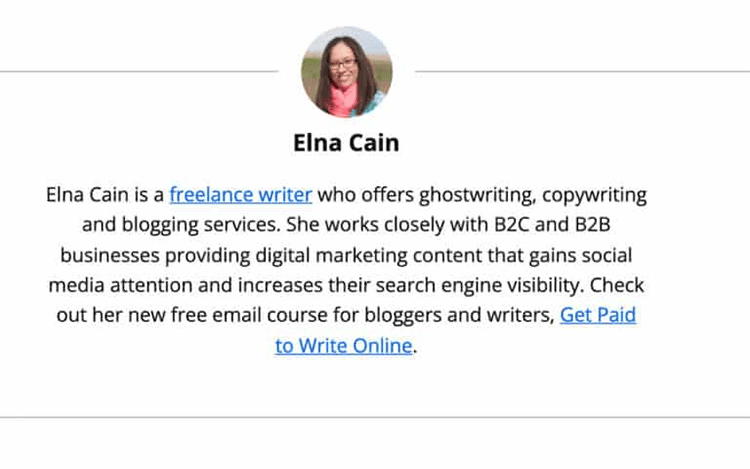
Option #3: Prove You Can Get Clients Results
The third option involves showing documented results for clients. This can include testimonials from previous clients, or it can be case studies.
One way you can do it is to track your search engine rankings or shares for each of the posts you write. This information will show that your posts do get results. If you can show screenshots like those in the example below, of being able to increase a client’s traffic by a certain amount, it can be a compelling reason for big companies to hire you.
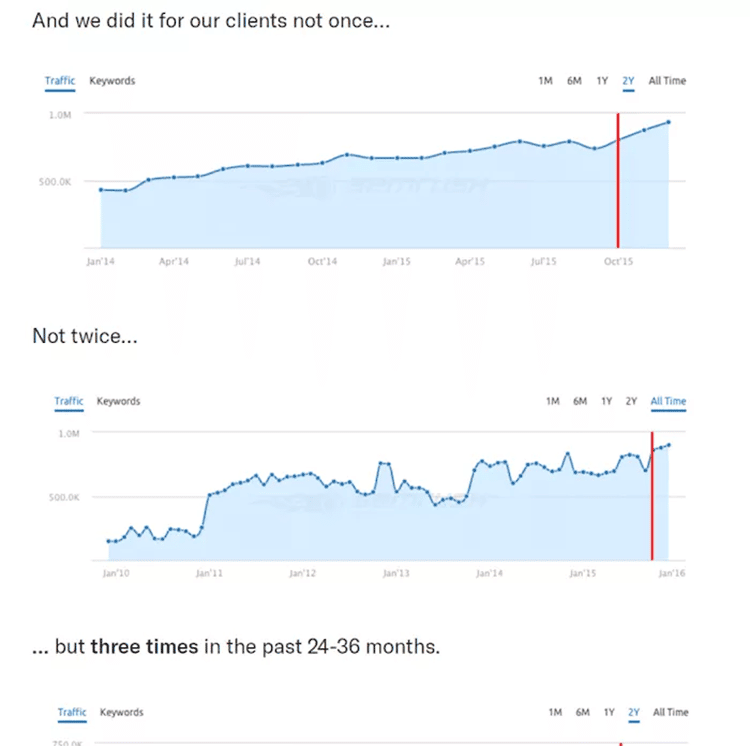
Of course, as a beginner, this option may not be available to you, but it should be one of your long-term goals to develop this kind of proof for yourself so you can increase your income. When you can get to this point, you will become one of the highest-paid writers in the world.
7. Market Your Writing
Now that you have everything in place, it’s time to start marketing your writing and let clients know what you have to offer.
This is an essential component of becoming a successful freelance writer. You can market yourself in a lot of different ways, but the most effective way is to have a professional website, blog, and social media profiles.
You can create content regularly on your blog. Follow SEO best practices to improve your search engine rankings.
In addition to a blog, here are some other pages you should have on your website:
- Writing Services Page: You can have a dedicated page detailing your writing services.
- About Page: Also, include an About page where you inform potential clients who you are, what you do, and how you can help them get the results they want.
- A Portfolio Page: Add a page with all your writing samples so would-be clients can browse your work.
- Contact Page: Make it as easy as possible for clients to get in touch with you by adding your details and possibly a contact form on your contact page.
- FAQ Page (Optional): You might consider adding an FAQ page to give potential clients answers to some of the most commonly asked questions.
You can also use your social media to market your writing services by posting links to any of your latest published articles and providing updates regarding your availability.
Similarly, you can post to business networking sites where there is a potential for high-paying clients to discover your work.
Another great way to market your writing is to guest post for other professional writers in your niche and host their content on your website.
8. Get Your First Client
Now it’s time to find freelance writing job opportunities so you can land your first client. As long as you’ve taken care of the skill and credibility factors, getting freelance writing jobs will be a lot easier for you.
Many aspiring writers feel that landing their first client is the hard part, but in truth, top freelance writers typically end up receiving more work than they’re able to handle. They end up having to choose which clients they want to work with according to the type of content and rate of pay.
That said, getting those first few clients is often a real grind. Here are a few tips to help you get started.
- Browse High-Quality Job Boards: There are many reliable job boards you can sift through. You’ll be able to easily search for jobs in your niche and set up alerts so that you’ll be notified whenever new jobs are posted. Some of the best options out there include ProBlogger, LinkedIn Jobs, and Freelance Writers Den. You can conduct a quick search to find out which job boards are most relevant to your niche.
- Apply for Agency Jobs: When getting started as a freelance writer with no experience, your best bet is to keep an eye on job postings from different content marketing agencies, like Brandpoint, Manifest, and others. They have an ongoing need for professional writers. So, instead of getting paid once, you can develop relationships with some of them to receive new freelance writing gigs regularly.
- Cold Pitch Companies: Sending cold pitches to companies is an effective way to get connections and possible opportunities. It shows initiative and a willingness to put in the extra effort to achieve your freelance writing goals. Just make sure you identify the right person for the job, tell them exactly why you contacting them, and personalize your message by including the recipient’s name and referencing some of their notable work that you admire. This will make it a lot more likely that you’ll get a response to your email.
You can set your own marketing funnel to grow your freelance writing business by bringing clients directly to YOU.
This is one of the best ways to achieve long-term success and the best part is, as long as you follow the steps in this guide, you’ll already have the foundation for it. You’ll be able to use your blog, portfolio, and social media to represent your work with confidence and attract the exact type of clients you want.
As you build your brand and reputation and improve your services, you’ll get higher-paying clients who truly value what you do.
Tips to Earn More As a Freelance Writer
1. Develop the Necessary Business Skills
Becoming a successful freelance writer isn’t just about writing. It’s also about your ability to market your writing, which means you have to treat your writing career as a business.
You must develop the necessary business skills, which might include things like:
- SEO skills
- Organizational skills
- Time management skills
- Communication skills
…and others.
So, for instance, to run a successful freelance writing business, you have to implement a solid writing routine that allows you to work on your projects and keep track of which ones are pending, in progress, or completed.
You also need a clear system to stay on top of pending and sent invoices, received payments, job applications, writing pitches, client responses, and more.
You might even maintain a list of writing ideas that you add to whenever you can so you never run out of subjects to write about.
As you can see, all of this requires some serious organizational, time management, and communication skills.
Another important skill for you to learn is search engine optimization. This will not only help you to market your own business, but it will serve you well in providing even more value to your clients.
Companies are more than happy to pay extra for someone who understands the fundamentals of SEO writing. So, consider improving your knowledge and use of keywords, user intent, competitive analysis, etc. to help your clients rank higher in search engines.
This will make your writing more valuable. For example, some freelance writers make over $1,000 per post because they have a proven track record of ranking well.
2. Improve Your Writing Skills
I’m assuming that if you want to become a freelance writer, you already have some skills to work with. However, no matter how good you are, there’s always room for improvement. After all, your skill at writing exceptional content will impact your level of income more than anything else.
Companies will pay the highest rates to writers who understand the importance of high-quality, well-researched, and engaging content that will get them the results they want. They are happy to pay copywriters and professional writers who will help them dominate other businesses in their space.
So, make sure you have a plan for developing your content writing skills so you can offer even more value to your clients and earn more as a freelance writer.
Some of the content writing skills you can work on include:
- Writing Magnetic Headlines: Your post headlines have a huge impact on the overall success of your content. Make sure you get into the habit of brainstorming a dozen or so headlines each day. Like anything else, becoming good at writing awesome headlines is mostly about practice.
- Mastering Content Frameworks: There are many different content frameworks you might be required to work with, such as list posts (i.e. 5 ways to do X). Research as many proven frameworks as you can that work well for your niche and do your best to master each one.
- Keeping Readers Engaged: People’s attention spans are growing shorter and shorter. You need to use different tactics in your writing that keep readers engaged emotionally so you can get them to take the appropriate action, whether it’s reading another post on the blog, sharing your content, leaving a comment, subscribing to the email list, etc.
You might consider taking a freelance writing course to help you hone your skills. You can find free and paid courses on sites like Udemy, Skillshare, and Alison.com.
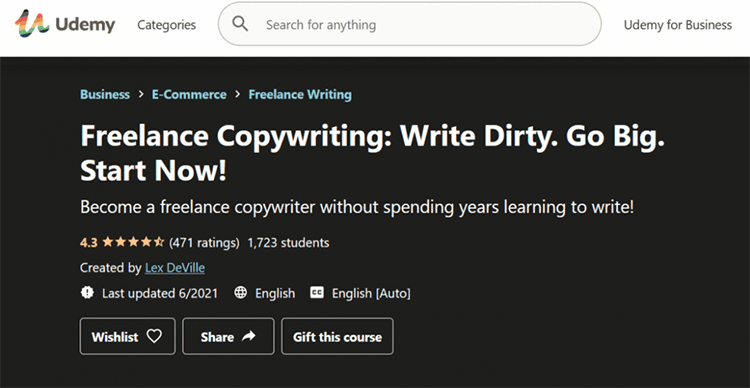
3. Follow Current Writing Conventions
Different types of writing have different conventions that you must follow. For example, someone writing for a magazine follows different conventions than someone who writes for a blog.
Online writing often requires the inclusion of helpful links to other online resources. You also have to use captivating headlines, short paragraphs, and other ways to break up text and make it scannable.
The way you’ll write and format a blog post will be very different from how someone writes an essay or academic paper.
That’s why you have to research the current writing conventions to understand which writing style will catch the reader’s attention and keep them reading until the end.
4. Be Human When Communicating with Editors
Whenever you communicate with editors, business owners, and anyone else that might seek to hire you, always make sure that your humanity and friendliness shine through.
Your emails or text messages must never be only about business all the time. But don’t make it complicated either. Just a simple remark about something that’s going on in their lives once in a while is enough to keep those professional yet friendly channels open.
5. Always Meet Your Deadlines
This should be common sense, but you would be surprised just how many freelance writers either forget deadlines or blow them off completely.
If you want to be successful as a freelancer, you not only have to create high-quality, well-researched content with accurate quotes and sources, but you also need to make sure your work is submitted on time, every time.
If something goes wrong and you can’t make the deadline, make sure you communicate with your editor. Whatever you do, don’t ghost the editor if you can’t make it on time.
Wrapping Up
There you have it, 8 tactics to become a freelance writer that editors will want to hire again and again.
And best of all, freelance writing gives you the opportunity to scale as much as you want. From a nice side income to a full-time job, to creating your own business, starting your own agency, and even becoming a publishing powerhouse!
So, if you’re ready, use the information in this guide on how to become a freelance writer to start getting paid to create outstanding content that informs, educates, and entertains.
